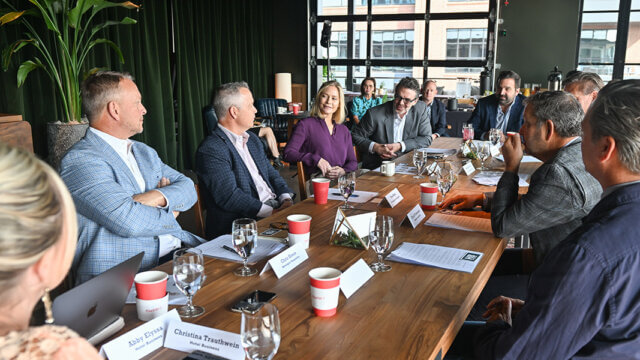COLUMBUS, OH—Hospitality companies have always supported philanthropic causes (or have created their own), but no more so than during the COVID-19 pandemic. The closing of many hotels at the height of the crisis led to thousands of associates being out of work, not knowing when that next paycheck would come. And if their property remained open, it likely meant reduced hours for many.
As it always does, the industry stepped up to help its team members, vendors and communities with new programs and initiatives to support those in need.
During the Hotel Business Executive Roundtable, “Leading the Charge: When Hotels Go Beyond the Boardroom,” held here at Smith & Wollensky restaurant, in conjunction with Rockbridge RTRX, which has raised millions of dollars for cancer research, six industry executives discussed their philanthropic activities during the pandemic, and how they will continue to offer their support when needed. The roundtable was hosted and sponsored by Rockbridge, and was moderated by Gregg Wallis, senior editor, Hotel Business.
Mike Deitemeyer, president/CEO, Aimbridge Hospitality, spoke of two initiatives that the management company launched during the pandemic.
“We took the opportunity to redistribute food and to make sure that it was going to places in the communities that we all work in and make our living,” he said. “The second thing that we did is, about 60 days after the shutdown—so April, early May—we launched a 501(c)(3) [organization], Aimbridge Aid, solely for the purpose of benefiting our associates. And we put a process in place where, through the hotels, we could help those in need. We were able to raise $1 million and redistribute that. We continue to use that now as a core part of our culture. Through payroll deductions and other things, employees and associates of the company can directly benefit those that are working beside them.”
Jim Merkel, cofounder/CEO, Rockbridge, has been impressed with the way the industry has looked out for its own during an unprecedented event.
“Everybody was struggling in this unknown environment—some a lot more than others—and I just saw a lot of people reaching out, rolling up their sleeves and helping others,” he said. “I think that’s one of the best things about our industry, and while it was a really tough time for all of us, it was a tougher time for a lot of others, and it’s just heartwarming to see the industry come together in so many ways.”
Christine Magrann, COO, Makeready, said her company created a family pantry for those in need.
“What we found is our team members and our leaders were most worried if they had young children or were taking care of elderly parents,” she said. “So, we created a pantry at all of our locations, which we still have today and I think that’ll be something that we do forever. Reduced hours or furloughed team members can come once a day, and it’s all dry goods that come from local donations, our purveyors and our farmers, and then just leftover products that are unopened. They can come and then stock their pantry at home with groceries.”
“What happened especially immediately after the start of the pandemic, our frontline associates were essentially almost at war,” said Robert Cole, president/CEO, Hospitality Ventures Management Group (HVMG) on the toll the pandemic took on those onsite at the hotels. “They had to be concerned for their health and safety, and had to be concerned for their financial well-being and emotional well-being.”
So his company focused on helping those workers—“the ones we had to, unfortunately, lay off and the ones that had got reduced hours and wages,” as Cole put it, adding, “We did the Associate Relief Fund and augmented our health benefits around mental health and creating paths for folks to get help when they needed it from a counseling perspective and an emotional perspective.”
HVMG applauded the efforts of the general managers at its hotels with some well-deserved time off. “What all of our frontline associates did, it’s nothing short of miraculous, and we encouraged all of our general managers to take time off with pay, and we could supplement that with corporate staff,” said Cole. “We would come and stay at the hotel. Our VPs or [regional directors of operations] would work just to give these guys a break because they only have one speed—nonstop.”
Teague Hunter, president, Hunter Hotel Advisors, said he was impressed with the brands and the owners who, early on, were housing the first responders. “When the hospital workers couldn’t go home because of the risk of bringing COVID home to their families, all the brands and owners were offering free hotel rooms for the hospital workers,” he said.
For Chris Diffley, managing director, investment, Rockbridge, the lack of face-to-face engagement took its toll on the mental well-being of the company’s associates.
“In a moment’s notice, our daily engagement with our team and the Rockbridge community went away,” he said. “That became hard not only for our hotel employees, but for even our corporate employees. So, we had to focus on getting that engagement back—face-to-face Zoom calls is where it all started—and then trying to get people back to the office. It was tough on a lot of team members to have to lose that sense of community, whether it be at the hotel level or at the corporate office.”
Look for more insights from the panelists, including the new ways companies communicate with their team members, the mentality of the industry to help its own and how employees were recognized for the job they have done during the pandemic, in the Sept. 21 issue of Hotel Business.

